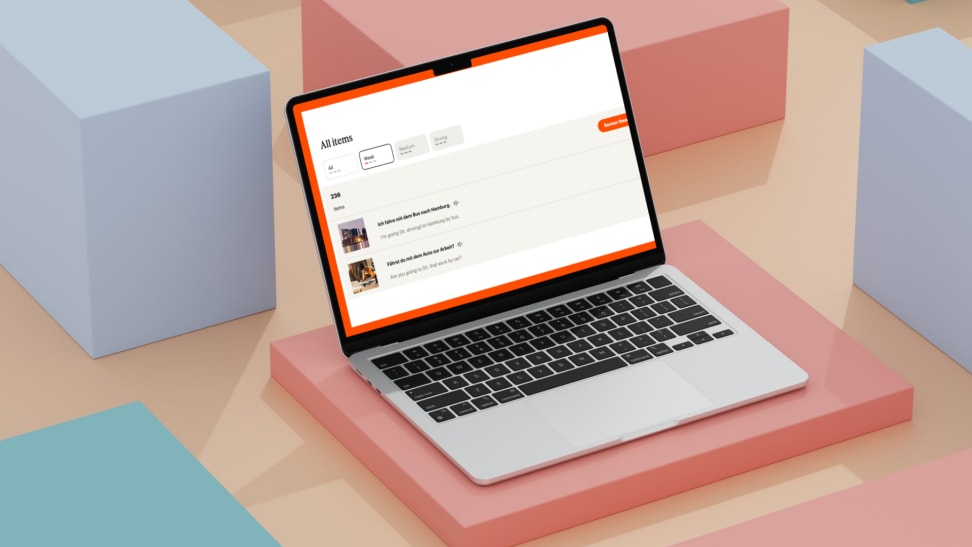Is Babbel worth it? We used it for two years to find out
A few conversation starters and we're on our way!
 Credit:
Reviewed
Credit:
Reviewed
Products are chosen independently by our editors. Purchases made through our links may earn us a commission.
There is no shortage of ways to learn a foreign language these days. From enrolling in a community course to language-learning apps, you have options when it comes to dipping your toes into international waters. When it comes to the latter, you’ll find free, gamified apps like Duolingo, traditional software like Rosetta Stone, and a personal favorite, Babbel (available at StackSocial), which we are reviewing here. With pricing starting at $8.95 per month and escalating to a Babbel lifetime subscription, we must ask the question, “Is Babbel worth it?” Here’s our experience.
About Babbel
- Babbel cost: Starts at $8.95 per month
- Languages available: 14 languages, including French, Spanish, Italian, Portuguese, Russian, Swedish, German, Turkish, Dutch, Polish, Indonesian, Norwegian, and Danish.
- Learning method: Interactive lessons, native speakers, real-life conversations, spaced repetition
- Skill levels: Beginner, intermediate, advanced
- Device compatibility: Windows 7 or above, or Mac OS X 10.13 or above, using Chrome, Firefox, Safari, or Edge; mobile devices like iPhone or iPad running iOS 15 or later, and Android devices 9.0 or higher.
The Babbel app sets itself apart from others by focusing on real-life skills and offering surprisingly helpful AI tools. And let’s be real, picking up a second tongue has some serious perks in today’s world: It can boost your brainpower, broaden your cultural horizons, and open up new career opportunities. For me, it was personal—a way to connect with my German roots after past language-learning fails.
Babbel has been my go-to for over two years after a failed attempt with Duolingo, which made me feel like I was merely memorizing words and not how to use or speak them in a conversation. * Previously, I also took Spanish in college and French in high school, but if you asked me to recite a single phrase, I’d come up short, as I just didn’t stick with either after the classes ended.
Babbel was named a GSV company, meaning it’s one of the top 150 companies making the biggest impact on education and lifelong learning globally. The app also has a 4.4-star rating on Trustpilot, where the company gives pointers to those who don’t have a 5-star experience.
For this Babbel review, we also talked to Dr. Esther Gutierrez Eugenio, language-learning expert, for her opinions on the app. She has a PhD in Language Education and over 20 years of experience learning, teaching, and researching languages. Today, she is on a mission to transform how students learn languages by applying the latest scientific research to make language learning more effective for everyone.
Is Babbel free?
Unfortunately, Babbel is not a free app, but there are tons of subscription tiers to choose from.
On Babbel’s website, you’ll find that the lowest commitment option is to subscribe for one month at $17.95. If you want to join for longer, the cost per month goes down accordingly in three-month increments, all the way down to $8.95 monthly for a 12-month subscription.
Babbel also offers a lifetime subscription, which will save people who are serious about learning a foreign language some serious cash. The most cost-effective option by far is a Babbel lifetime subscription at just under $170. You only pay once, and then you’re set for life. This also means you never have to worry about the next subscription payment kicking in or feeling like you’re “wasting” money if you want to take a week off.
Ultimately, the plan that’s right for you lies within your goals. If you only intend to learn a language for an upcoming trip with no intent to continue, a month-to-month approach may be cheaper than springing for the lifetime version, which is best for those with long-term goals.

Choose one or all 14 languages currently offered through Babbel language learning app. It uses time-tested strategies proven by academics from Yale University, City University of New York, and Michigan State University to help beginner, intermediate, and advanced students of any age.
Read Our ReviewBabbel’s learning methodologies

With Babbel's specially-designed learning methodology, you can learn a language more intuitively.
A big question is why other language-learning methods failed me, and why Babbel is working, at least this far? When I first got the app, I was motivated by stellar Babbel reviews and advertisements. Only now am I digging into the real reasons why its three core methods are truly effective.
Dr. Gutierrez Eugenio also weighs in on these strategies and whether or not she has or would use them in her teaching methods.
Strategy 1: Real-life conversational topics
Each Babbel lesson aims to present only topics and terms used in the real world instead of just showing you colors, numbers, or animals.
From the very first Babbel lesson to this day, I’ve only learned practical words and phrases—like immediately how to introduce myself, speak about my family, and stuff of that nature. Dr. Gutierrez Eugenio feels that exercises like these are useful for boosting motivation, but they may raise other questions about how the language works. For instance, she once had a student who felt they were repeating words “like a parrot” without understanding why the sentence was formed that way.
Babbel does attempt to supplement each lesson with a fundamental vocabulary or grammar lesson that relates to the new material; however, I think it’s next to impossible to give new learners all the necessary information upfront. But that doesn’t mean you can’t continue working with what you have and collecting knowledge nuggets to grow your understanding—like anything else, there are just limitations.
Strategy 2: Voices of native speakers
In a world where AI becomes increasingly omnipresent, it’s refreshing to know that the voices used in Babbel’s language-learning app are from native speakers (unless stated otherwise, like within the AI lessons).
Does this make a difference? When using Babbel, I assumed having native speakers was a positive thing to help with motivation. Who would rather listen to a robotic-sounding voice that scrapes their ears instead of real people speaking? But Dr. Gutierrez Eugenio offers a perspective I hadn’t even considered.
She suggests that such dialogues might be too advanced or confusing for new learners. “My goal when I introduce a new word is that the student creates a phonetic image in their mind as soon as possible,” and teach them a standard version of the word before Babbel’s native speaker one.
Strategy 3: Spaced repetition
There is hardly anything more detrimental than forgetting what you learn along the way and having the foundational knowledge you need to continue advancing fall between the cracks. Perhaps it’s Babbel’s spaced repetition that makes it so effective.
You don’t just get introduced to a word and have the luxury of never seeing it again—the app wants you to repeat it six more times during designated review sessions. Dr. Gutierrez Eugenio encourages repetition for her students, but with some structure.
She recommends spreading three or four short sessions throughout the day, rather than one daily session, for maximum retention. Babbel supports this idea—after every lesson containing new material, the app prompts you to review previously learned material.
Dr. Gutierrez Eugenio also notes how it’s important to “expose the student to the word in as many different contexts as possible, so they learn all the possible nuances and collocations with that word.” Babbel lets you choose review methods such as listening, speaking, flashcards, and writing, so be sure to give yourself a variety to maximize the app's benefits.
What we like about Babbel
Creating a learning goal builds a solid foundation
The first thing I remember about Babbel is the app prompting me to create a learning goal. I was so motivated that I put myself on the most vigorous path and set daily reminders to return for lessons.
I dove into my first lesson within a few minutes, eager to start from scratch, even though I had a foundation from my time using Duolingo. I thought a recap of anything I knew prior would be helpful, but not much of what I learned before was repeated, as Babbel started with a completely different type of vocabulary.
The first few Babbel lessons taught me how to introduce myself, talk about my profession, order food and drinks, and make plans. They start by introducing new vocabulary, usually through pictures and an audio recording of how to pronounce it.
I’ll admit I went ahead and repeated them out loud, no matter how crazy I looked to my dog. Each lesson also includes a grammar concept that ties into the new words, like making sure you use the appropriate form when addressing strangers.
Babbel’s AI features enhance learning through its conversation partner

Babbel's AI features can be a major help in learning your new language, offering a robot to practice your speech with and more
AI is quite literally everywhere these days, so unsurprisingly, Babbel is utilizing the tech. Something they call speech recognition within lessons was already a standout part of the experience when I first downloaded the app, but recently, they’ve been adding more and more AI components at no additional cost. These details are crucial to consider in any Babbel AI review.
The most remarkable addition is the AI conversation partner. You know how a lot of people fall off learning a new language because they don’t have any real way to practice, like someone else who speaks German in their area? Well, Babbel is using AI as the solution, allowing learners like me to have somewhat realistic conversations with an AI partner.
Review lessons allow me to easily catch up after a break

A screen in the Babbel language learning app displays a lesson in German.
Babbel’s personalized reviews are far more my speed. I’ve taken breaks during the past two years, and I often need a refresher when I come back. Review lessons mean I don’t have to backtrack in my progress. Instead, I spend a week or so going back over the material, so I’m in the right headspace again. I can also choose the review format between flashcards, listening, speaking, or writing.
The app keeps track of how many times I’ve seen each term, and that determines which are the most crucial to go over again and which are probably in my long-term memory.
Even when I’m regularly taking lessons, I make a habit of reviewing to stay sharp when new words are introduced to my vocabulary bank. On days when I just don’t feel like learning anything new or don’t have the time, I’ll opt for one of these sessions instead to keep my learning streak and the energy going.
Mobile accessibility means you can use any kind of device
Learning should never be confined to a classroom or even your desktop computer. Babbel understands this, delivering a seamless and consistent interface across all your devices, especially mobile. Whether you’re using an iPhone, an Android tablet, or another beloved device, the app’s interface adapts smoothly, ensuring that lessons, reviews, and AI-powered tools are there, no matter where you are.
I almost exclusively use Babbel on my iPhone. It’s just the most convenient that way. My reminder notification pings in the early evening, and my phone is always with me, even though I’m never in the same place. I’ve done lessons in bed, at bars, on walks, and even at rodeos—you can truly do them anywhere.
Offline capabilities mean you can learn anywhere if you plan ahead

You'll be able to download Babbel lessons when you're connected to WiFi, and learn when you're offline.
As someone who lives in a remote area with poor Wi-Fi access, I regularly use Babbel’s offline mode. When I have a good connection, all I have to do is tap a button to download complete lessons or an entire section. There’s no limit to how much you can download, unless your device's capacity fills up.
This feature is also great for those who frequently travel and want something to do on long flights. You could stay entertained for hours and brush up on your speaking skills before landing in Paris or Berlin.
The progress tracking dashboard is a good motivator

Stay motivated with your studies with Babbel's game-like learning method and progress tracking widgets.
Within the Babbel app, there are a few areas to track how far you’ve come.
On the “Learn” tab, you’ll see a pie chart that displays how far you are in the current course. If you want to see an overview of your progress in the entire language, head to “Explore” and then “Courses” to see the full list and your progress in each.
These tiny charts are a strangely good motivator, especially seeing them slowly fill up more and more each day. When you open each course, it’s also paired with a description like “21/79 lessons completed,” so you know exactly how many more are needed to complete the chart. Trust me, it’s a huge sense of accomplishment to fill one and move on to the next course.
What we don’t like about Babbel
Podcasts are too advanced for beginners
Aside from the main lessons, Babbel offers several other educational tools. The podcasts are an excellent way to practice your listening comprehension skills, though I find them very challenging as all of the words are in German—of course, that’s the idea, but I’m just not advanced enough to listen to them yet. They’re meant to supplement your skills outward instead of only forward.
You’ll find that each podcast category is sorted by language mastery level, and that corresponds to the main lessons. With the German course, it’s ideal to make your way through four of the thirteen courses before exploring the podcasts. You can listen to them whenever you want, but you probably won’t understand much right away.
Customer support and services are fine, but lack a personal connection
Babbel offers customer service support primarily through its online help center, which provides a comprehensive database of articles and FAQs. You can probably find an answer to your question if it’s about account management, technical issues, or course content.
If your question or concern exceeds the basics, you can use their online chat feature for more help. You’ll find that this is powered by AI for instant answers. Will it be helpful? Maybe, and maybe not. But rest assured, if the AI can’t get you your answer, it’ll send a message to a real person for actual help.
The Babbel app—or any other—can’t replace real-life engagement at advanced or mastery levels
Can you become fluent with Babbel? Great question.
Babbel’s course names directly correspond to the levels of language proficiency defined by the Common European Framework of Reference for Languages (CEFR), such as A1, A2, and B2. In theory, once you’ve completed all of Babbel’s lessons and supporting materials for those sections, you should be speaking the language with that proficiency.
However, Babbel does not have lessons matching C1 (Advanced) and C2 (Proficient), indicating that the app might not bring you to complete fluency. After using the app for a couple of years, I can see the limitations and potential gaps here—how could an app possibly cover every German word, grammar rule, or language nuance?
Dr. Gutierrez Eugenio states, “There is a difference between offering courses at advanced levels and providing the type of quality engagement and interaction expected at C1.” So, even if Babbel did offer those courses, you truly do just need the real-life interaction and immersion of a cultural setting or contextual factors to achieve full fluency.
What Users Are Saying About Babbel
We scoured the web looking at other users’ Babbel reviews, to see if they agree or disagree with us. Here’s what we found on sites like TKX and TKY.
- Reddit: Over at Reddit’s /languagelearning feed, a user says, “Personally, after spending 4 years wasting my time trying to learn a language by myself without any conversations, I decided to start French at the end of May. The conversational style of learning, being an unknown environment and getting embarrassed often with my poor language skills have made me into a hardened, grateful veteran of this app who has also started Italian on it.”
- Trust Pilot: On Trust Pilot, over 27,000 users give Babbel 4.4 out of 5 stars. Gunilla says, “The beginner level was brilliant. After that I would have liked to learn a bit about the grammar before moving on to the intermediate level. However, grammar only just started after the intermediate level. Otherwise it's a great program which I use every single day.”
- StackSocial: 275 users give Babbel 4.8 stars out of 5 on this site that sells a lifetime subscription at a deep discount. Buyer Erfan Gholampour says, “I've tried Duolingo and Memrise, and I thought Memrise is the better app until I tried Babbel and I liked how well structured it was. It is easy to go back and study previous lessons or just the grammar which is missing on the other apps.”
Is Babbel worth it?
Yes

Study a new language this year (and forever) with a Babbel lifetime subscription.
After more than two years of coming back to Babbel, it has become an integral part of my language-learning journey. It’s more than just an app; it’s a structured environment and partner that has genuinely improved my German proficiency.
Dr. Gutierrez Eugenio’s overall expert opinion is that apps like Babbel help practice in a controlled environment. When learning a language under any method, she shares that many get stuck in a phase where they’re somewhat able to use a language but don’t have the fluency to use it in real life. That’s where an app can help you practice in a comfortable environment, giving you convenience and all the time you want to build sentences.
Ultimately, we have to agree. We think Babbel is an excellent tool for most people with the desire to become a polyglot. If you have reasonable expectations for what an app has to offer, you’ll likely be happy using and learning from Babbel for several years.
And that begs a final question, “Is Babbel lifetime worth it?” I don’t regret it for a second.

Choose one or all 14 languages currently offered through Babbel language learning app. It uses time-tested strategies proven by academics from Yale University, City University of New York, and Michigan State University to help beginner, intermediate, and advanced students of any age.
Read Our Review


